Related Research Articles
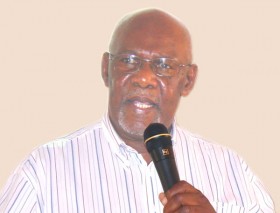
Dumiso Dabengwa was a Zimbabwean politician. He served as the head of Zimbabwe People's Revolutionary Army (ZIPRA) intelligence during the Rhodesian Bush War.

Tendai Laxton Biti is a Zimbabwean politician who served as Finance Minister of Zimbabwe from 2009 to 2013. He is the current Member of Parliament for Harare East Constituency and the second Vice President of Movement for Democratic Change. He was the Secretary-General of the Movement for Democratic Change and the subsequent Movement for Democratic Change – Tsvangirai (MDC-T) political parties and a Member of Parliament for Harare East until he was expelled from the party and recalled from parliament in mid-2014,before winning the seat again in 2018.
Sydney Tigere Sekeramayi is a Zimbabwean politician who served in the government of Zimbabwe as Minister of Defence between 2013 and 2017. He has been a minister in the Cabinet since independence in 1980, serving as Minister of Defence from 2001 to 2009 and Minister of State Security from 2009 to 2013.
Patrick Antony Chinamasa is a Zimbabwean politician who served in the government of Zimbabwe as the minister of various cabinet ministries. Previously he served as the Minister of Finance and Investment Promotion and the Minister of Justice, Legal and Parliamentary Affairs.
Nicholas Tasunungurwa Goche is the former Minister of Transport. Previously he was Minister of Public Service, Labour and Social Welfare. Minister of Transport and Infrastructure Development. He served during the tenure of Robert Mugabe who replaced him in 2014 with Prisca Mupfumira after he was accused of trying to kill the President as part of a coup.
Simbarashe Herbert Stanley Makoni is a Zimbabwean politician and was a candidate for the March 2008 presidential election against incumbent Robert Mugabe. He was Minister of Finance and Economic Development in President Robert Mugabe's cabinet from 2000 to 2002. He faced strong opposition during the Economic Change in Zimbabwe in the early 2000s as his policies contradicted those of the rest of the ZANU-PF party.
Amos Bernard Muvengwa Midzi was a Zimbabwean politician who served in the Cabinet successively as Minister of Energy and Power Development and Minister of Mines and Mining Development from 2002 to 2009.
Obert Moses Mpofu is a Zimbabwean politician, who served as Minister of Home Affairs from 2017 to September 2018. Previously he was Minister of Macro-Economic Planning and Investment Promotion; Minister of Industry and International Trade; Minister of Mines and Mining Development; and Minister of Transport and Infrastructure Development. The Cabinet of Zimbabwe was later dissolved on 27 November 2017. He was reappointed as Minister of Home Affairs in Mnangagwa's first cabinet on 30 November 2017. The Culture portfolio was added to his ministry. Mpofu was later removed from the Zimbabwe cabinet in September 2018.
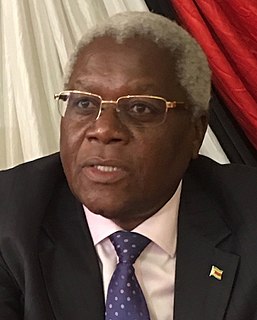
Ignatius Morgen Chiminya Chombo is a Zimbabwean politician who was Finance Minister of Zimbabwe in 2017. Previously he has served in the Cabinet of Zimbabwe as Minister of Home Affairs from 2015–17, Minister of Local Government, Public Works and Urban Development from 2000–2015.
Webster Kotiwani Shamu is a Zimbabwean politician and former Minister of Mashonaland West Provincial Affairs fired by President Emmerson Mnangagwa on 21 May 2018. He previously served as Minister of Information and Publicity, and Minister of State for Policy Implementation. He is a member of parliament representing the Chegutu constituency. The Cabinet of Zimbabwe was later dissolved on 27 November 2017.
Dr. Samuel Creighton Mumbengegwi was a Zimbabwean politician. He was the brother of the former Minister of Foreign Affairs, Dr. Simba Mumbengegwi.
Campaigning for the first round of the presidential election held in Zimbabwe on 29 March 2008 took place from February to March. There were three major candidates: President Robert Mugabe of the ruling Zimbabwe African National Union - Patriotic Front (ZANU-PF), Morgan Tsvangirai of the opposition Movement for Democratic Change, and the independent candidate Simba Makoni.
This article gives details about the vote counting system for the 2008 Zimbabwe presidential election
Zambian President Levy Mwanawasa called an emergency meeting of SADC leaders for 12 April during the 2008 Zimbabwe presidential election to discuss the post-election impasse. According to Mwanawasa, Zimbabwe's "deepening problems" meant that the issue needed to be "dealt with at presidential level". Jacob Zuma, meanwhile, said that he thought results should have already been announced, and he described the failure to release them as "unprecedented".
The second round of voting in the Zimbabwean presidential election of 2008 was held between Robert Mugabe and Morgan Tsvangirai after the first round failed to produce a 50% majority for either candidate. The election process was marred by violence against and intimidation of voters and party workers, which eventually led to the withdrawal of Tsvangirai from the poll. This left Mugabe as the winner of, effectively, a one-candidate election.
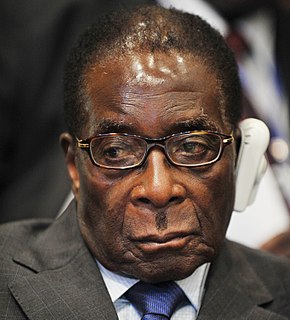
The 2008–2009 Zimbabwean political negotiations between the opposition Movement for Democratic Change, its small splinter group, the Movement for Democratic Change – Mutambara, and the ruling Zimbabwe African National Union – Patriotic Front were intended to negotiate an end to the partisan violence and human rights violations in Zimbabwe and create a framework for a power-sharing executive government between the two parties. These negotiations followed the 2008 presidential election, in which Mugabe was controversially re-elected, as well as the 2008 parliamentary election, in which the MDC won a majority in the House of Assembly.
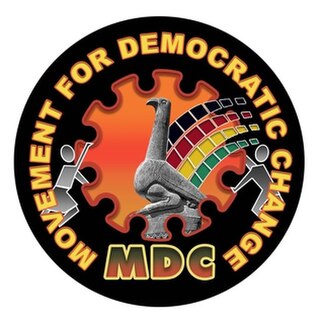
The Movement for Democratic Change – Tsvangirai (MDC–T) was a centre-left political party and was the main opposition party in the House of Assembly of Zimbabwe ahead of the 2018 elections. After the split of the original Movement for Democratic Change in 2005, the MDC–T remained the major opposition faction, while a smaller faction, the Movement for Democratic Change – Ncube, or MDC–N, was led by Welshman Ncube. The two parties re-united in 2018 under the original name, the Movement for Democratic Change.
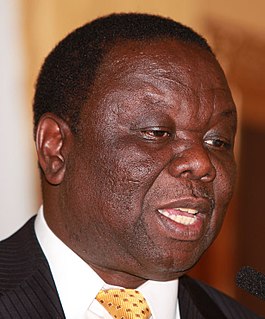
Morgan Richard Tsvangirai was a Zimbabwean politician who was Prime Minister of Zimbabwe from 2009 to 2013. He was President of the Movement for Democratic Change, and later the Movement for Democratic Change – Tsvangirai (MDC–T), and a key figure in the opposition to former President Robert Mugabe.

General elections were held in Zimbabwe on 31 July 2013. Incumbent President Robert Mugabe was re-elected, whilst his ZANU–PF party won a two-thirds majority in the National Assembly.

General elections were held in Zimbabwe on 29 March 2008 to elect the President and Parliament. Because of Zimbabwe's dire economic situation, the elections were expected to provide incumbent President Robert Mugabe with his toughest electoral challenge to date. Mugabe's opponents were critical of the handling of the electoral process, and the government was accused of planning to rig the election. Human Rights Watch said that the election was likely to be "deeply flawed."
References
- ↑ Page at Zimbabwean Parliament website (2006 archive).
- ↑ Zimbabwe: Muckraker –Sliding Into a Totalitarian State, 22 June 2007. AllAfrica
- ↑ "Zim names its latest batch of instant farmers", Reuters (IOL), 4 January 2002.
- ↑ "Zimbabwe's cabinet after the shuffle", Sapa-AFP (IOL), 25 August 2002.
- ↑ "Mugabe rewards loyalists in new Cabinet", New Zimbabwe (zimbabwesituation.com), 9 February 2004.
- ↑ "Mugabe retains old guard during shuffle", Reuters (IOL), 7 February 2007.
- ↑ Zimbabwe designations; Zimbabwe designations removals.
- ↑ "Equity bill: 'There is no reason to panic'", Sapa-AFP (IOL), 11 March 2008.
- ↑ "Zimbabwe: Zanu-PF Names Poll Candidates", The Herald (allAfrica.com), 15 February 2008.
- ↑ "Zimbabwe election results 2008" Archived 5 April 2008 at the Wayback Machine , newzimbabwe.com.
- ↑ "Mugabe appoints acting ministers: report", Sapa-AFP (IOL), 7 January 2009.